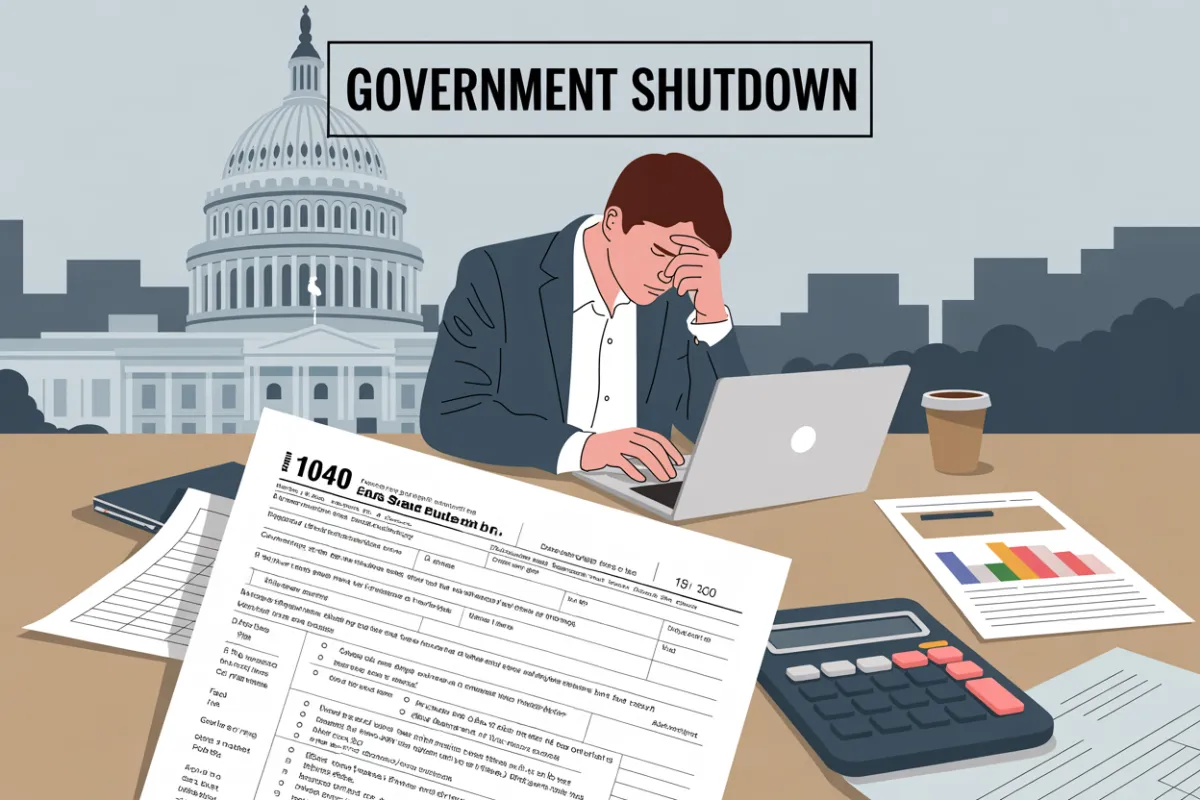Contact Us
office@taxsherpa.com
(678) 944-8367
Follow Us:
Our Blogs
On our blogs you will find our Tax Sherpa Stories series as well as additional posts covering all manner of tax topics. Some items are timely as there are multiple tax filing dates throughout the year and some items are important larger concepts.

Federal Shutdown 2025: Critical IRS Tax Deadline Updates for Small Biz
What the Federal Shutdown Means for Your Tax Deadlines
If you’ve been trying to get through to the IRS this week, you’re not imagining things—it’s quieter than ever.
Early this morning, the Taxpayer Advocate Service announced on X (formerly Twitter) that it is shutting down entirely due to lack of funding. Meanwhile, the IRS has furloughed roughly 40,000 employees, leaving about 34,000 still working—a steep drop from more than 100,000 full-time staff earlier this year.

https://x.com/YourVoiceAtIRS/status/1975909408774218169
This is more than a headline it’s a ripple effect that impacts every small business owner waiting on an answer, a refund, or a resolution.
⚠️ What’s Still Happening, and What’s Not
Here’s the bottom line:
Tax deadlines haven’t changed.
The upcoming October 15th filing deadline for 2024 returns still stands.
But nearly everything that requires a human being—like processing mailed correspondence, responding to notices, or picking up the phone—will be even more delayed than it’s been all year. That includes:
Responses to IRS letters and penalty appeals
Refund reviews and amended return processing
Identity verification and transcript requests
Resolution of payment plans or notices
Electronic systems like e-file and online payments remain functional. However, expect significant lags if your situation needs a live agent.
💬 Why This Matters for Entrepreneurs
For solopreneurs and small business owners, the heart of the U.S. economy, this disruption lands at the worst possible time. Many are already dealing with:
Tax notices that go unanswered for months
Refunds stuck in limbo
Uncertainty about compliance deadlines
It’s not just frustration, it’s financial anxiety.
When the IRS goes silent, entrepreneurs lose the sense of control they crave over their finances.
This moment perfectly illustrates the “tax ambush” fear many business owners live with: that something unseen like a delay, an error, or a missed response could unravel their stability overnight.
🧭 What You Can Do Right Now
Even in a shutdown, there are proactive steps you can take to protect your position and reduce uncertainty:
File on time, even if you can’t pay yet.
Missing the October 15th deadline adds automatic penalties that can snowball fast. File electronically to ensure it’s logged on time.Document everything.
Keep digital copies of letters, filings, and correspondence. The paper trail will matter when the IRS resumes normal operations.Monitor your IRS account online.
Use the IRS online account portal to check balances and verify submissions. It’s one of the few systems still operating reliably.Don’t send paper mail unless absolutely necessary.
Mail will sit unopened in backlog bins until staffing resumes.Lean on your tax advisor.
Professionals have secure e-services access and can guide you through this waiting period strategically especially if your business depends on deductions or compliance deadlines.
🧩 How Tax Sherpa Helps You Stay Ahead
At Tax Sherpa, we know solopreneurs thrive on clarity and control—two things the IRS isn’t delivering right now.
That’s why our proactive planning systems ensure:
Your returns and extensions are filed electronically and on time
Your books and deductions are optimized year-round
You have a direct line of strategy, not just compliance
When government delays stall progress, strategy keeps you moving forward.
Think of it as your financial GPS during the shutdown, a way to keep building your business while others wait for Washington to catch up.
🪜 Next Step: Get Your 2025 Tax Strategy in Motion
Don’t let the IRS shutdown put your plans on pause.
Book a free 20-minute Tax Strategy Session to clarify your next steps before October 15th.
We’ll review your filings, highlight opportunities, and help you stay compliant—without waiting on hold.
👉 Schedule your Tax Strategy Session
📌 Final Thought
Government gridlock doesn’t have to stall your growth.
This moment underscores a deeper truth: the most resilient entrepreneurs aren’t reactive, they plan ahead.
While the IRS catches up, you can use this window to tighten your systems, maximize deductions, and move into 2025 with clarity and confidence.
Because even when Washington stops your financial strategy shouldn’t.
Frequently Asked Questions
Q:
What's the difference between tax advisory and just filing my taxes?
Filing your taxes each year is a necessary task, but it is always backwards looking. Tax advisory works with you throughout the year to make sure that you are on the right track when it comes to your taxes and have strategies in place to save money now.
Q:
I've heard about tax write-offs for small businesses. What exactly can I write off, and how does it benefit my business?
Tax write-offs, also known as tax deductions, are expenses that a business incurs that can be subtracted from its revenue to reduce the amount of taxable income. Common write-offs include office supplies, mileage, rent for a business location, and advertising expenses, among many others. By writing off legitimate business expenses, you can significantly reduce your taxable income, which can lead to a lower tax bill. It's essential, however, to maintain proper records and ensure that the expenses are truly business-related.
Q:
What's the difference between a tax deduction and a tax credit?
A tax deduction reduces the amount of your income that is subject to taxation, which in turn can lower your tax liability. Common deductions include expenses like mortgage interest, student loan interest, and business expenses. A tax credit, on the other hand, is a direct reduction of your tax bill. This means if you owe $1,000 in taxes and have a $200 tax credit, your tax due would be reduced to $800. Some popular credits include the Child Tax Credit, the Earned Income Tax Credit, and credits for energy-efficient home improvements.
Q:
I'm thinking of hiring an independent contractor instead of an employee. Are there different tax implications for each?
Yes, there are significant tax differences between hiring an employee and an independent contractor. When you hire an employee, you're responsible for withholding federal and possibly state income taxes, Social Security, and Medicare taxes from their paychecks. You also typically pay unemployment taxes on wages paid to employees. Independent contractors, on the other hand, are responsible for their own taxes. As a business owner, you'd provide them with a Form 1099-NEC (if you pay them $600 or more during the year) instead of a W-2, and they would be responsible for their own self-employment taxes. It's important to correctly classify your workers, as misclassifying can lead to penalties.
Get in touch with us
Have questions? Use the form here and one of our knowledgable staff will get back to you as soon as possible.
(678) 944-8367
office@taxsherpa.com
2302 Parklake Dr NE Ste 675
Monday - Friday, 10:00 am - 5:00 pm
Send us a message

Follow Us
Follow Us
Disclaimer: The content presented on this website is intended for informational purposes only and is not tailored to the needs of any specific individual or entity. It should not be considered as financial, investment, or tax advice. The information provided is general in nature and does not account for individual circumstances or financial positions. Before making any financial or tax-related decisions, we strongly advise consulting with a qualified professional who can provide guidance tailored to your individual situation. All information on this site is provided in good faith, but we make no representation or warranty of any kind, express or implied, regarding the accuracy, adequacy, validity, reliability, availability, or completeness of any information on the site. Use of this site and reliance on its content is solely at your own risk.
Services
More
Contact Us
office@taxsherpa.com
(678) 944-8367
2302 Parklake Dr NE Ste 675
Atlanta, GA 30345
Monday - Friday, 10:00 am - 5:00 pm
© Copyright 2026. Online Tax Solutions Group LLC dba Tax Sherpa. All rights reserved.
